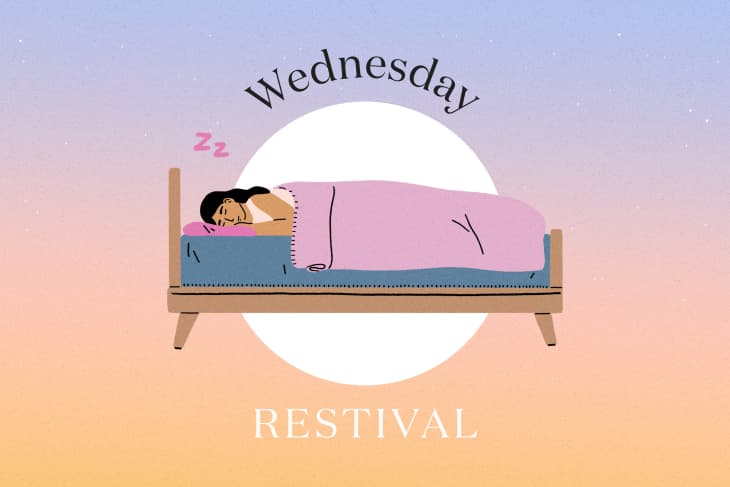Blue Light Before Bedtime When to Turn Off
I Turned Off My Blue Lights an Hour Before Bed for a Week — Here's What Happened

Welcome to Restival Season, Apartment Therapy's series about slowing down, sleeping more, and relaxing however you can — no fancy wristbands needed.
Can I be honest? I'm not good at sleeping, and it's nobody's fault but mine. Since I had my kids, I've been forced to cram my alone time into the hour or two between their bedtime and mine — which, most nights, amounts to mindlessly scrolling social media while catching up with mom friends via text. It's weird: I feel sleepy by the time I make my way upstairs for bed, but most nights, I toss and turn for 30 minutes or more before I actually get some shut-eye.
Science confirms my suspicion that devices before bed just aren't a good idea. It's not just the mental stimulation from screen time that prevents sleep — it also has to do with blue light, a short wavelength of light that comes from many electronic devices. The first thing to know: Blue light isn't always bad; in fact, you need natural blue light from the sun in order to have a healthy circadian rhythm. Blue light exposure in the morning stimulates hormones that help your body wake up and get going.
At first, I blamed the double-duty stress of parenting and working full-time for my inability to wind down (and stay asleep) at night. But the more time I spent on social media (thanks, TikTok), the more I realized my faux-relaxation ritual was backfiring.
But if you get too much blue light at night from electronics, those same wake-up hormones could wreak havoc on your rest. "Blue light is stimulating, so if we have too many electronics close to bedtime, it will suppress your natural melatonin production and make it harder to fall asleep," says Dr. Kuljeet Gill, a sleep medicine specialist at Northwestern Medicine Central DuPage Hospital in Winfield, Illinois.
Gill told me one way to support a healthy circadian rhythm (and as a result, quality sleep) is to restrict electronics an hour or two before bed, so I decided to challenge myself to a period of no scrolling before bed to see how I slept. Every night for a week, I plugged my phone into a charger in the living room around 7:30 or 8 p.m. to give my eyes and brain a break. Instead, I paged through magazines, chatted with my husband, worked on my gallery wall, or took a bath — anything to keep my eyes off my phone.
Here's what happened:
At first, I'll admit, I didn't notice a difference in my sleep quality. The first two nights, I tossed and turned as normal (and one night, even more) before falling asleep. I even did some deep breathing exercises to calm my body, but I just couldn't settle down. I wonder, in hindsight, if my body needed a couple of days to readjust my rhythm.
Things started improving by mid-week, with an interesting twist. When I decided to catch up on "The Handmaid's Tale" before bed (sans phone, of course), I slept even better than when I did with no electronics at all. I don't know if the show actually helped me sleep, but it probably didn't make things worse. While no screens are probably better than screens, Gill told me not all electronics are created equal. "It's a lot better to watch a show on TV, because it doesn't produce that same blue light as an iPad or phone, and your eyes aren't as close," she says.
I continued watching shows at night with my phone in the other room for the rest of the week, and honestly, I didn't even miss the scroll. My sleep continued to improve throughout the trial — instead of my usual 30-60 minutes, I gradually worked my way down. The last night of my experiment, I was sound asleep within 10 or 15 minutes and, surprisingly, stayed asleep the whole night. As a result I woke up in a better mood and with much more energy than is normal for me. (Don't get me wrong, I still had my usual two coffees.)
Here's what I learned:
I'm not sure how sustainable it is for me to cut out all phone time, mostly because I like to socialize with friends after all our kids are in bed, and phones are a really convenient way to do that. Fortunately, there are some other options: If it's not possible to cut out personal devices a few hours before bedtime, Gill suggests turning on "dark mode" if you absolutely have to look at your phone; you can also invest in a pair of blue light-blocking glasses or phone pouch that may help you minimize your screen time, or at least be more aware of how often you pull your phone out from its case.
My go-to rhythm going forward will probably be a combination of all those things. I'm going to keep up with my show-watching routine, since it didn't seem to interfere with my sleep. If I feel the need to be on my phone, I'll keep it on dark mode and do my best to put it away at least an hour before bed. The most important thing, to me, is understanding how habits can impact how I feel — and that even the tiniest, simplest shifts can make a big difference in living a healthier life.
Source: https://www.apartmenttherapy.com/turning-off-blue-lights-hour-before-bed-36920047
0 Response to "Blue Light Before Bedtime When to Turn Off"
Postar um comentário